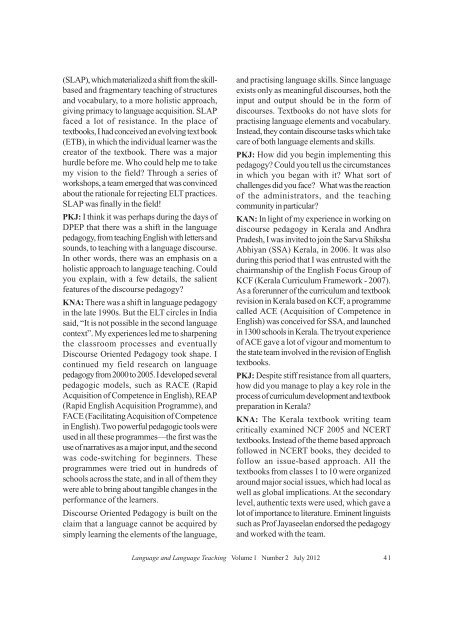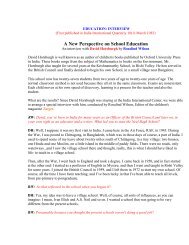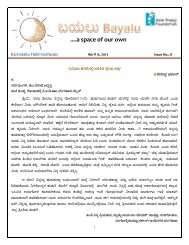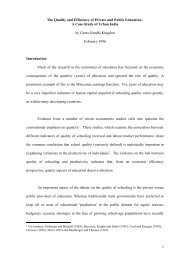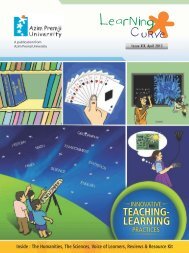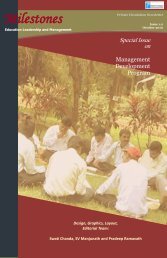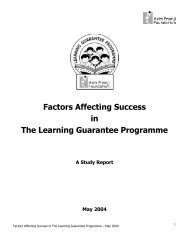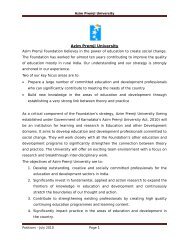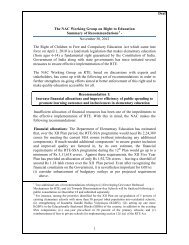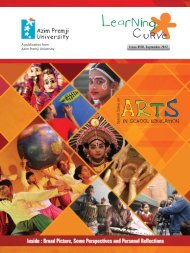Language and Language Teaching, Issue 2 - Azim Premji Foundation
Language and Language Teaching, Issue 2 - Azim Premji Foundation
Language and Language Teaching, Issue 2 - Azim Premji Foundation
Create successful ePaper yourself
Turn your PDF publications into a flip-book with our unique Google optimized e-Paper software.
(SLAP), which materialized a shift from the skillbased<strong>and</strong> fragmentary teaching of structures<strong>and</strong> vocabulary, to a more holistic approach,giving primacy to language acquisition. SLAPfaced a lot of resistance. In the place oftextbooks, I had conceived an evolving text book(ETB), in which the individual learner was thecreator of the textbook. There was a majorhurdle before me. Who could help me to takemy vision to the field? Through a series ofworkshops, a team emerged that was convincedabout the rationale for rejecting ELT practices.SLAP was finally in the field!PKJ: I think it was perhaps during the days ofDPEP that there was a shift in the languagepedagogy, from teaching English with letters <strong>and</strong>sounds, to teaching with a language discourse.In other words, there was an emphasis on aholistic approach to language teaching. Couldyou explain, with a few details, the salientfeatures of the discourse pedagogy?KNA: There was a shift in language pedagogyin the late 1990s. But the ELT circles in Indiasaid, “It is not possible in the second languagecontext”. My experiences led me to sharpeningthe classroom processes <strong>and</strong> eventuallyDiscourse Oriented Pedagogy took shape. Icontinued my field research on languagepedagogy from 2000 to 2005. I developed severalpedagogic models, such as RACE (RapidAcquisition of Competence in English), REAP(Rapid English Acquisition Programme), <strong>and</strong>FACE (Facilitating Acquisition of Competencein English). Two powerful pedagogic tools wereused in all these programmes—the first was theuse of narratives as a major input, <strong>and</strong> the secondwas code-switching for beginners. Theseprogrammes were tried out in hundreds ofschools across the state, <strong>and</strong> in all of them theywere able to bring about tangible changes in theperformance of the learners.Discourse Oriented Pedagogy is built on theclaim that a language cannot be acquired bysimply learning the elements of the language,<strong>and</strong> practising language skills. Since languageexists only as meaningful discourses, both theinput <strong>and</strong> output should be in the form ofdiscourses. Textbooks do not have slots forpractising language elements <strong>and</strong> vocabulary.Instead, they contain discourse tasks which takecare of both language elements <strong>and</strong> skills.PKJ: How did you begin implementing thispedagogy? Could you tell us the circumstancesin which you began with it? What sort ofchallenges did you face? What was the reactionof the administrators, <strong>and</strong> the teachingcommunity in particular?KAN: In light of my experience in working ondiscourse pedagogy in Kerala <strong>and</strong> AndhraPradesh, I was invited to join the Sarva ShikshaAbhiyan (SSA) Kerala, in 2006. It was alsoduring this period that I was entrusted with thechairmanship of the English Focus Group ofKCF (Kerala Curriculum Framework - 2007).As a forerunner of the curriculum <strong>and</strong> textbookrevision in Kerala based on KCF, a programmecalled ACE (Acquisition of Competence inEnglish) was conceived for SSA, <strong>and</strong> launchedin 1300 schools in Kerala. The tryout experienceof ACE gave a lot of vigour <strong>and</strong> momentum tothe state team involved in the revision of Englishtextbooks.PKJ: Despite stiff resistance from all quarters,how did you manage to play a key role in theprocess of curriculum development <strong>and</strong> textbookpreparation in Kerala?KNA: The Kerala textbook writing teamcritically examined NCF 2005 <strong>and</strong> NCERTtextbooks. Instead of the theme based approachfollowed in NCERT books, they decided tofollow an issue-based approach. All thetextbooks from classes 1 to 10 were organizedaround major social issues, which had local aswell as global implications. At the secondarylevel, authentic texts were used, which gave alot of importance to literature. Eminent linguistssuch as Prof Jayaseelan endorsed the pedagogy<strong>and</strong> worked with the team.<strong>Language</strong> <strong>and</strong> <strong>Language</strong> <strong>Teaching</strong> Volume 1 Number 2 July 2012 41


